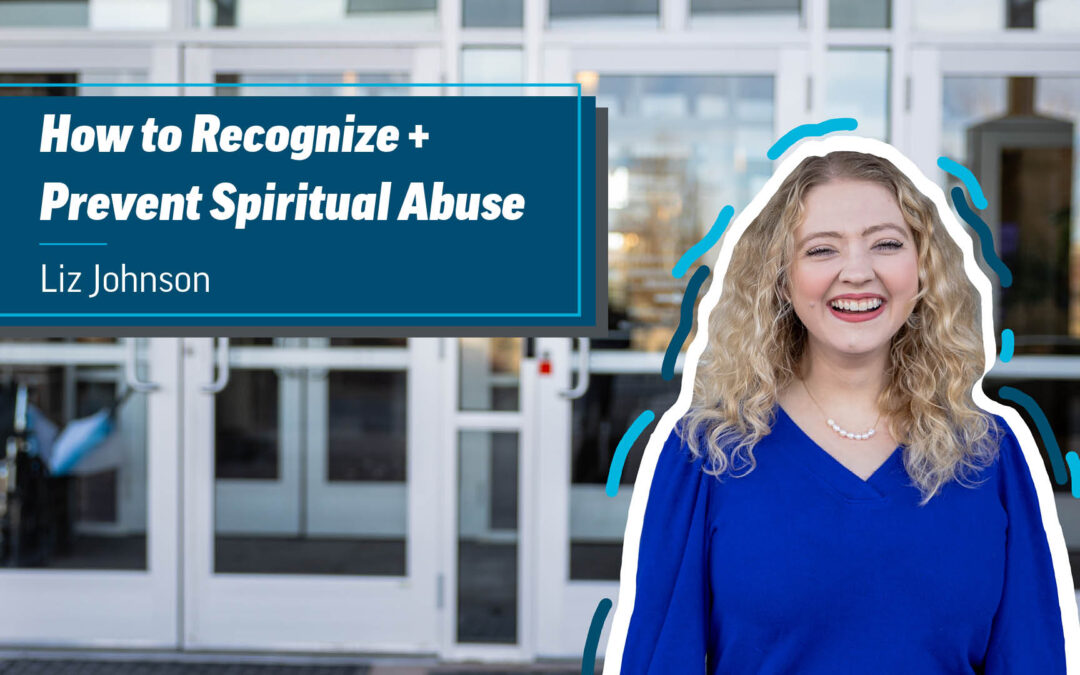Spiritual abuse, religious abuse, and church hurt are a few terms that you may have heard recently. The mention of spiritual abuse is becoming more common as people share their experiences. It is not something to be taken lightly as someone mentioning abuse is equivalent to conflict.
Believers who have experienced it are, understandably, no longer attending church or have walked away from their faith completely. Before we get into how to recognize and prevent it from happening, let’s find a level playing field by defining the term.
Laying the Groundwork
Define spiritual abuse: a form of emotional and psychological abuse within a religious context often using sacred texts and spiritual authority to control and degrade a person. Jenai Auman says spiritual abuse is, “using God’s words to dehumanize God’s beloved.”
Signs of spiritual abuse:
-
-
- Manipulation (gaslighting, silent treatment, shame tactics etc.) which can distort a person’s sense of reality and degrade a person’s trust in others and themselves.
- Spiritual authority or position is used to control or dominate another person who is often in a “lower” or more vulnerable position.
- Requirements to remain silent or things to be kept secret in efforts to protect the image of either the church or people in authority or both.
- Misuse of sacred texts or teachings often means taking scripture out of context to either justify the perpetrator’s actions or to control the victim. The obligation of needing to obey religious morals and texts makes it very difficult for victims to question or critique leaders.
- Exploitation of vulnerability whether that is through taking advantage of insecurities or life challenges to gain control and loyalty.
-
Potential Effects from Spiritual Abuse
Trauma overwhelms people’s coping mechanisms leading to long-term effects in the brain. Trauma physically changes our bodies including alteration of our body’s alarm system and heightens stress hormone levels therefore impacting us socially, emotionally and physically.
Research shows that brain scans comparing a “healthy” brain versus someone who has experienced trauma shows that there is a physical change. Things like panic attacks and hyperarousal could also be a result of trauma. (See this book for more information: The Body Keeps Score).
-
-
- Greater likelihood of experiencing symptoms of depression and anxiety.
- Mistrust of Christians, religious leaders or anyone in authority.
- Avoidance and/or anxiety around scripture, religious rituals, religious or spiritual beliefs, or anything that reminds them of past harm.
- Shift in how they believe God relates to them personally- God might be seen as oppressive and condemning after God’s word was used as a weapon to harm them.
- Feelings of self-blame for what happened. It is a mechanism our minds use to protect us as we try to make sense of what happened.
-
“The idea of abuse being simply conflict is one of the biggest mistakes that churches make. I think it is evidence of a lack of understanding of what they are seeing and this desire to quickly solve it and get everybody in a room where you can hug and apologize to each other and move on.” – Michael Kruger
Personal Story of Spiritual Abuse
I just finished my second year of college, and I was working at a Christian camp over the summer. The camp was associated with a Christian college, and I had always heard good things about the community there.
The first month went smoothly until the end of June. My supervisor’s behavior suddenly changed towards me, and I noticed excessive flattery, praise and promises which then led to her asking to become my ‘Christian mentor.’ Due to the power dynamic, I felt inclined to say, ‘yes.’
I was told to read my Bible more and read certain verses to relieve the anxiety I was experiencing. Certain chapters were stated to me and I was told that gratitude is biblical and that good Christians have gratitude. Otherwise, I am sinning by experiencing anxiety. My supervisor willingly informed me how to live a righteous life yet seemed to easily omit Gospel centered values such as grace and compassion.
Her behavior was then cold and detached towards me followed by an extremely hurtful comment regarding Christians who experience anxiety or depression. The expression on her face and tone of voice also informed me that she meant what she said. At that moment, my only defense was silence, and I froze in place. The psychological term is, ‘freeze response.’ The next day I told her that I didn’t appreciate what she said and that her words hurt me.
Without realizing in the moment what was happening, she shifted the blame onto me. I then became the perpetuator, and she became the victim. This is known as gaslighting, an extremely toxic form of manipulation.
A few hours later, I was called back into the office with another staff member who oversaw the camp staff. Without any examples of work performance or how I could improve, I was told that I was, ‘no longer fit to work here.’ I also was told that I needed to leave the camp by the next morning. My supervisor then escorted me back to the cabin where I was staying like I was a common criminal. I never got the chance to share my side of the story.
Gasping for the oxygen of validation and justice, I decided to write a letter to the camp Director.
The injustice and the exploitation of vulnerability I experienced in a Christian environment had such traumatic effects. I questioned if I could trust God, others and myself. I tried to keep going to church but my body shook in the pew, and I couldn’t retain anything from a sermon. Church and Christians didn’t feel safe anymore.
I grew up with the expectation of attending church weekly. Experiencing such fear around attending church caused a lot of shame. Eventually, through community and therapy, a lot of healing took root through candid, safe and validating conversation with others. I can now hear, see and read God’s word without the taste of poison in my mouth.
After years of wrestling with what happened, if I didn’t have the non judgemental and compassionate space of others who sat with me in my pain, I likely would not have continued to be a believer today.
What can I do to help prevent spiritual abuse?
-
-
- You’ve already done a crucial first step by reading this far: being willing to learn and to remain curious. Seek humility to listen to people’s stories of experiencing hurt from the church without making assumptions unless you know the whole story.
- Encourage church leaders, volunteers and congregants to become trauma informed.
- Lean into possible discomfort you may feel when people share, they have hurt by the church and be willing to recognize that it takes a lot of courage for someone to voice such a deep wound.
- Collaborate with professionals to provide support to the congregation, staff or anyone who may need additional mental health support.
- Create safe spaces where people can feel safe and supported if the mention of trauma comes up – Build a healthy work culture where every aspect, whether that is emotionally, physically, financially or mentally, of a staff member is taken under consideration.
- Ensure that there are accountability structures where people can come forward with concerns without retaliation.
-
“When somebody tells us they have been abused by the church or they have been abused by a leader that’s not an invitation for us to defend the church, it’s an invitation for us to lean in and to listen and to hear their stories.” – Natalie Runion
Additional Resources:
A Church Called TOV by Scot McKnight and Laura Barringer
Bully Pulpit: Confronting the Problem of Spiritual Abuse in the Church by Michael Kruger
Broken to Beloved | A nonprofit organization offering support groups and more
Holy Hurt Podcast by Hillary McBride
Raised to Stay Podcast by Natalie Runion
Redeeming Power: Understanding Authority and Abuse in the Church by Diane Langberg
Spiritual First Aid | Offers trainings for church members and staff from professionals
The Lord is My Courage by K.J. Ramsey
The Soul of Desire by Curt Thompson
When Narcissism Comes to Church: Healing Your Community from Emotional and Spiritual Abuse by Chuck DeGroat

AUTHOR CREDITS

Resident

GRAPHIC CREDITS
🎨 Credit | Eric Price
Graphic Design Specialist


